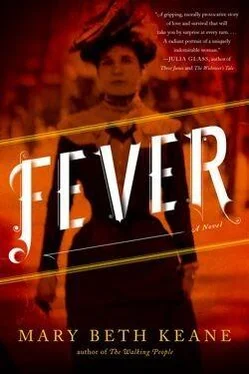The water tunnels were not for me. Maybe you predicted as much. I’ve been shaping for scaffolding work.
I’ve asked around about lawyers and went to see one who advertised in the paper but he didn’t seem to understand what I was talking about when I explained. Then I went back and brought the newspaper articles but he wasn’t interested. I will keep trying.
I wish I knew what to do to help. Is there anyone there you trust who can give you advice?
Alfred
“Alfred,” she said, and felt bile rising in her throat as her stomach turned. She walked out of her hut to the water’s edge. Which day was he standing over there, trying to find her? Maybe they could coordinate; in her next letter she could suggest a date and time. But as soon as she had the idea she felt sick again. To do what? To wave? To blow kisses at each other from opposite sides of Hell Gate? Pressing her fists to her mouth, she closed her eyes and tried to think of what to do.
They tried to get her to accept the schedule, to stop making so much of the twice-weekly testing of her blood, urine, and stool, the handing over of samples, the visits to the lab, the monthly physicals, the dipping of her hands in chemicals and the scrutiny of her fingernails. They needed to track her patterns, one doctor explained when she asked why twice a week was necessary. The nurses chatted with her as if this had all grown to mean nothing to her, but when they saw that she couldn’t get past it, that it was a humiliation she would never get over, no matter how long it went on, they disliked her for it. They came in pairs, and eventually stopped bothering with her, chatting only with each other. Every week, when Monday rolled around again, after coaching herself all weekend to be better, to try, to show that she was a good sport, to prove that she was trustworthy enough to be set free, they appeared at her door with their cheery faces and their glass canisters and made her livid all over again. “But what are the results?” Mary asked. “I keep submitting to these tests but I never get results.”
“Positive, I imagine,” a nurse said. “Or else why would they keep you here?”
When she posed the same question to Dr. Albertson or Dr. Goode, they said only that individual tests didn’t matter. Single weeks didn’t matter. They would share results with her as soon as they had enough data to draw firm conclusions. Patience, they counseled. Everything took time.
The only person she didn’t mind talking with was the gardener, John Cane, who had nothing to do with the testing and often left a bundle of flowers at her door. Even when her fury spread so wide it swept up everything in her path, including him, he seemed to barely take notice. He just talked and talked and talked. And when she talked, he listened. She searched the newspapers he brought for advertisements for law offices, and wrote letters asking for help. She wrote to the chief of police. She wrote to the head of the agency that had placed her at the Bowens. When the doctors and nurses continually refused to share the test results with her, she contacted an independent lab to ask if they would do private testing for her if she sent samples, and requested additional canisters from the nurses. In her next letter to Alfred she told him to go into the pantry at home, move aside the flour and the sugar, and there he’d find her bankbook. She instructed him to bring the book down to the bank on Twenty-Third Street where she had an account and arrange payment for the Ferguson Lab. “And then take the rest of it for yourself and close the account,” she instructed. “Show them this letter if they don’t believe you.” There wouldn’t be much left over, but it was something. She didn’t need money on North Brother, and she was worried about him.
• • •
Some days passed quickly and easily, and some days felt so long and empty that she couldn’t even muster the energy to find something to do. Six months went by. Ten. She wrote to Alfred every other week and tried to fill those letters with hope. She reminded him that North Brother was temporary and one day soon she’d be home and life would go on as it had before. It was important that she believe it, she knew, and just as important that he believe it. She found the determined tone of her letters echoed in his, at first, but then as the months slid by, his responses were spaced further apart. When a letter from him did arrive, the messages were so compact that she couldn’t find him in the words. After a long silence, he sent a letter in February 1908 that was barely a letter at all:
Dear Mary,
Missing you. Any news? Things are fine here.
Alfred
As always, she’d held the envelope for a moment before tearing it open. She’d studied the way he wrote her name. And then to finally give in to that pleasure, to unfold the paper after looking forward to it for so long, only to find that it was nothing, was almost worse than getting no letter. She vowed she would not write back to him, but then a few days went by and she gave in.
Dear Alfred,
I got your note. Please write more next time. You don’t know how lonely it is here and how I wonder all the time how you’re getting by. Maybe you imagine there are people around me all the time, but remember that most people on this island are very ill, and as for the doctors and nurses it’s not as if we’re friendly with one another. I’ve been knitting and trying crochet. The gardener lets me help him when there’s work, and that’s a distraction, but the ground has been frozen since December and the first tulips won’t push through until April. I’ve read every book in the hospital library. It’s only when I don’t hear from you for a long time that I worry I’ll be here forever. When I do hear from you I remember that North Brother Island is not my whole world. They don’t know what to do with me here. They can’t treat me like a sick person because I’m perfectly healthy but if they admit I’m healthy they’d have to let me go. When I ask questions I can see they look upon me as a nuisance. I don’t know what’s taking so long to figure out. Next month will be a year!
I wake up every day determined to get back home, back to our routine, and I think when I do get back home I won’t take any situation that takes me away overnight. Not for a long time, anyway.
How are you doing? Two letters ago you said you were getting regular work. Is that still the case? Any news from anyone in the building? Do they ask for me? Remember to take care of yourself. And please, Alfred, try to be better about writing.
Mary
She wanted to ask him if he was drinking, if his clothes were clean, how he was paying the rent when all of her spare money must be long gone, if he had enough money for the gas meter, but didn’t want to remind him of their fights.
On the day that marked the first anniversary of her arrival — a milestone only Mary seemed to notice — she counted his letters and stacked them on top of one another on the small table of her hut. There were nine in all. She calculated back over the year and figured she’d written to him at least twenty-five times. She noted the date stamped on each envelope: two months between the eighth and ninth letters. One month since she’d last written to him — the longest she’d gone without writing since her arrival on North Brother. That she wanted to hear from him, that she needed to see the blank space she’d left behind, was something she shouldn’t have to explain, not after how long they’d been together, how well they knew each other. She felt raw, heartbroken, frustrated. If she could see him in person for a few minutes she’d know what he was thinking, but there was no use wishing for that. She returned each letter to its envelope and placed the stack on the ledge over the sink.
Читать дальше












